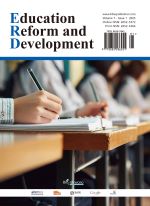Abstract
With the passage of time, machine learning algorithms represented by deep learning have been gradually applied to machine vision, speech recognition and other fields, and have obtained certain results. Around big data, cloud computing and other technologies to provide very sufficient data resources, artificial intelligence is entering a period of rapid development, but also in the profound changes in various fields of society, the state requires the setting of digital, intelligent education, but the integration of artificial intelligence and education path still need to be explored, has not yet formed up and down the effective integrated education system. Based on this, this paper focuses on the research on the integration of artificial intelligence into the teaching model reform, in order to provide reference ideas for artificial intelligence education activities and help the intelligent development of education and teaching.
References
Shao M, 2019, Opportunities and Challenges of Management Accounting in the Era of Big Data and Artificial Intelligence. Fortune Today, 2019(4): 146.
Qian Y, Shi R, 2019, Exploration on Talent Training of Financial Engineering under the Background of Artificial Intelligence. Education Modernization, 6(33): 1–3 + 8.
Yan Z, Tang X, Qin X, et al., 2017, Connotation, Key Technologies, and Application Trends of Artificial Intelligence in Education (EAI): Analysis of the Report “Preparing for the Future of Artificial Intelligence” and “National Strategic Plan for Artificial Intelligence Research and Development” in the United States. Journal of Distance Education, 35(1): 26–35.
Tang Y, Guo L, Xie Y, et al., 2017, Research on STEM Interdisciplinary Integration Model Based on the Support of Educational Artificial Intelligence. China Audio-visual Education, 2017(8): 46–52.
Mou Z, 2017, Rethinking and Solving Personalized Learning Theory in the Era of “Artificial Intelligence +”. Journal of Distance Education, 35(3): 22–30.
Wang X, 2022, School Teaching Time in the Age of Artificial Intelligence: Form Reconstruction, Value Clarification, and Teaching Response. Journal of Education, 2022(4): 37–46.
Lin H, Yang L, Wang X, 2018, Construction of Classroom Teaching Community: From “Coexistence” to “Symbiosis”. Educational Theory and Practice, 2018(29): 3–6.
Liu Z, Hu F, 2022, Understanding the Meaning of Life: The Underlying Logic and Educational Direction of Man-Machine Interaction. China Audio-visual Education, 2022(11): 1–9.
Wang Z, Wang T, 2019, On the Cultural Logic of “Self-consciousness” in “Life · Practice” Pedagogy. Science of Education, 2019(6): 14–19.
Li C, Tang A, 2021, Difficulties and Clarity of Classroom Teaching in the Era of Artificial Intelligence. China Audio-visual Education, 2021(8): 42–47.
Liu H, Zou H, 2021, High Quality: The Transformation of the Development Direction of China’s Basic Education. Educational Research, 2021(4): 11–24.
Song Y, 2022, Research and Practice of New Class Teaching Enabled by Artificial Intelligence. Global Education Perspectives, 2022(10): 19–29.
Yang T, Xu T, Li Q, 2023, Construction, Demonstration, and Optimization of International Chinese Teachers’ Intelligence Literacy Index System. Journal of Yunnan Normal University (Teaching and Research Chinese as a Foreign Language), 2023(3): 41–52.
Yuan X, Wu Y, 2023, ChatGPTPlus Brings Opportunities, Risks, and Countermeasures to International Chinese Education. Journal of Yunnan Normal University (Teaching and Research Chinese as a Foreign Language), 2023(3): 53–62.
Xu Y, Deng G, 2023, A Probe into the Justice Problem and Justice Principle of Intelligent Education. Journal of Guiyang University (Social Sciences Edition), 2023(1): 106–111.
